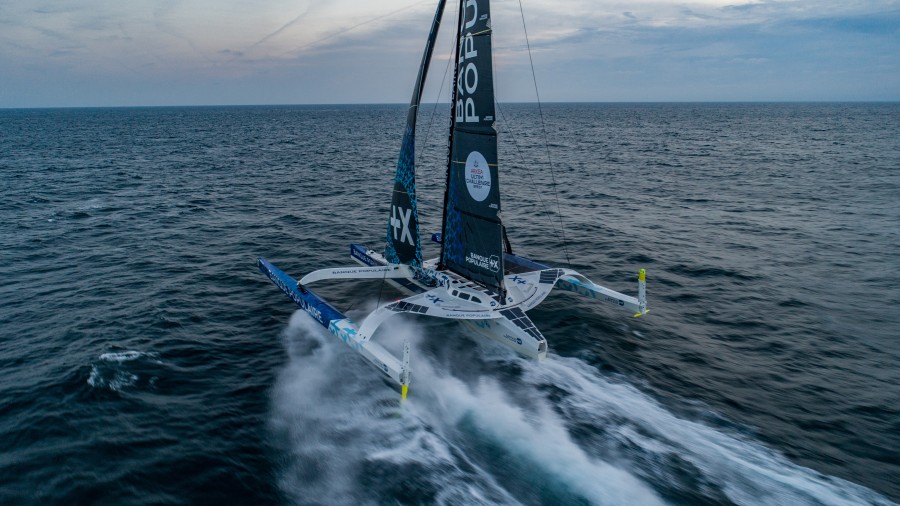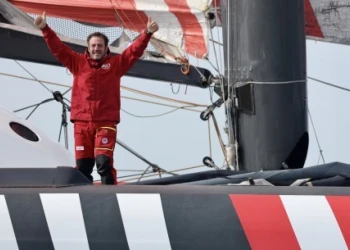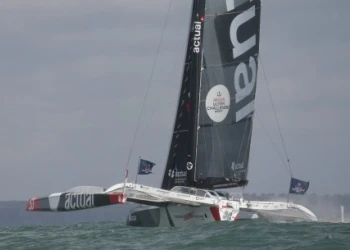
Ultim Challenge - Brest, Armel Le Cléac'h back on track
Ultim Challenge - Brest, Armel Le Cléac'h back on track
After a little more than 48 hours of technical stopover in Rio de Janeiro, Arkea Ultim Challenge-Brest skipper Armel Le Cléac'h and his ULTIM Maxi Banque Populaire XI have returned to the race track. He docked out from Rio at a little after 1630hrs UTC and resumed racing in third place at 1738hrs UTC.
Thanks to great cooperation from the authorities in France and Brazil the Banque Populaire XI technical team were able to replace the two rudders damaged in the South Atlantic. On leaving the dock Le Cléac'h said his only ambition is to get to the finish line of the race.
"It has been an incredible logistical feat," explained Le Cléac'h, "An important chain of solidarity was put in place and allowed us to leave as quickly as possible."
Le Cléac'h's technical stopover lasted a little more than two days since it began on Friday, in the bay of Rio de Janeiro at 1417hrs on Friday. On site they had five members of the technical team who were already waiting for Armel Le Cléac'h.
"The team first carried out a technical assessment to evaluate all the damage," explained the skipper. They had to make good two damages, one which occurred last Tuesday following a collision with the port float rudder, the second hit was on Thursday on the central rudder. "
The two replacement rudders were transported from France and were received on site at 3 a.m today (local time, 7 a.m. in France)
"We were fortunate to be helped by many people, at the French embassy in Brazil, at the Ministry of Foreign Affairs and even Brazilian customs. All of them allowed us to have the rudders available so quickly," explains Le Cléac'h. " I would like to share my warmest appreciation for those who helped us over the last two days."
The assembly of the rudders therefore was completed this morning, Sunday.
"The team remained 100% focused on optimizing the repair as much as possible and allowing me to return to sea."
Although he helped where he could with the repairs, Armel also took the opportunity to rest. "It's been more than 40 days since I've been able to sleep a full night or take a shower. I was able to rest well." However, there is no question for Armel of any relief from the pressure. "I didn't have time to really take time off, I stayed on the boat a lot and I didn't switch off from race mode at all."
Having lost second place to Coville again last night Le Cléac'h said today, "I don't want to look ahead ahead but we absolutely know that everything is still possible in this round the world race. All the boats are tired, the sailors are tired and this race is extraordinary, destiny can change in a fraction of seconds. All I want to do is get to the finish line, I want to go to the end to be able to finish this extraordinary adventure".

Arkea Ultim Challenge-Brest. No respite from the constant noise.
THE SUNDAY QUESTION. Every Sunday we develop a theme, answer a big question or drill down into a topic. This week it is noise. It is a constant aboard these ULTIMs. There are the waves and spray on the floats and hull, there are the appendages whistling and humming, the stresses and strains on the rig and indeed the whole aero package. On the one hand the sounds are often how the skippers interpret what is going on with their boat, the contented even hum of high speeds and relatively flat water to the cacophony of heavy loads and alarms going off all the time. Living, working, operating these giants the sounds never stop and are usually useful but they are also tiring and exhausting, especially after six weeks at sea.
The noise readings are actually surprising. At Sodebo they actually measured the noise on board and the data is astonishing: it is often at 100 decibels, the equivalent to the sound of a chainsaw or the speakers in a disco. And to fully understand you have to learn and understand where all these sounds come from.
"The noise varies depending on the pace and speed," explains Éric Péron (ULTIM ADAGIO). "The foils whistle, the daggerboards vibrates, the waves hit against the hull and the connecting arms. Sometimes the boat bounces, the sheets and ropes hit the structure... It's just constant noise!"
"We can't fight this sound"
"The noise on board? It's just hellish." Reiterated Anthony Marchand (Actual Ultim 3) the other day. "But you can't just tell yourself that it's hell, otherwise you'll never last two months! We have no other choice but to adapt. And we realize that over time the human body is capable of adapting to many things, much more than you might think."
That said the body suffers, ears and hearing included. Armel Le Cléac'h often wears noise-cancelling headphones.
"When I take them off and I return to normal volume, it is like being on an airport runway," explains Le Cléac'h, skipper of the Maxi Banque Populaire XI. "In fact my hearing in one ear is less good because of sailing with noisy boats."
"It's almost a danger to your health," emphasizes Thomas Coville. "It ends up irritating inside the eardrum, it's almost embarrassing."
Yet, despite everything, it's impossible to cut yourself off from all these sounds.
"The thing is that we need to listen to them, to interpret them to know if everything is going well on board," adds Éric Péron.
"We can't fight this sound," explains Thomas Coville. "The clicking noises, the alarms, the impacts on the hull: everything requires us to be even more alert, even more attentive. The slightest vibration has a meaning, it alerts me, it reassures me." For the skipper of Sodebo Ultim 3, noises are a necessity, "The multiplicity of sounds that we hear constantly has ended up attuning our ear. It allows us to properly trim the boat and therefore adds to the skills of being a good sailor."
And, of course, getting away from the noise is a small motivation to return to the land as quickly as possible to enjoy the sounds of silence as a reward in its own right.
"It's a strange facet of life on board because as soon as you set foot on land, on a stopover or on finishing you quickly get used to all the comforts and the calm and silence are part of it," smiles Anthony Merchant.
And Coville concludes: "Silence along with the smells of life on land and simply being still are among the things that I miss the most on a boat, what I need the most".




